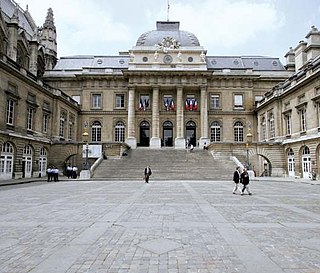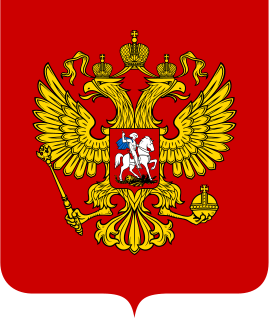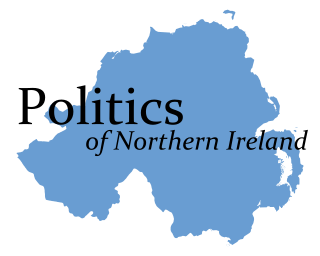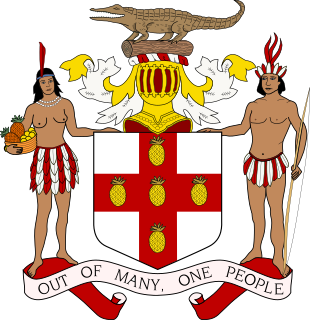
The Court of Appeal is the highest court within the Senior Courts of England and Wales, and second in the legal system of England and Wales only to the Supreme Court of the United Kingdom. The COA was created in 1875, and today comprises 39 Lord Justices of Appeal and Lady Justices of Appeal.

The Court of Cassation is one of the four courts of last resort in France. It has jurisdiction over all civil and criminal matters triable in the judicial system, and is the supreme court of appeal in these cases. It has jurisdiction to review the law, and to certify questions of law, to determine miscarriages of justice. The Court is located in the Palace of Justice in Paris.

The High Court of Justiciary is the supreme criminal court in Scotland. The High Court is both a trial court and a court of appeal. As a trial court, the High Court sits on circuit at Parliament House or the former Sheriff Court building in Edinburgh, or in dedicated buildings in Glasgow and Aberdeen. The High Court sometimes sits in various smaller towns in Scotland, where it uses the local sheriff court building. As an appeal court the High Court sits only in Edinburgh.

The courts of Scotland are responsible for administration of justice in Scotland, under statutory, common law and equitable provisions within Scots law. The courts are presided over by the judiciary of Scotland, who are the various judicial office holders responsible for issuing judgments, ensuring fair trials, and deciding on sentencing. The Court of Session is the supreme civil court of Scotland, subject to appeals to the Supreme Court of the United Kingdom, and the High Court of Justiciary is the supreme criminal court, which is only subject to the authority of the Supreme Court of the United Kingdom on devolution issues and human rights compatibility issues.

The Judiciary of Russia interprets and applies the law of Russia. It is defined under the Constitution and law with a hierarchical structure with the Constitutional Court and Supreme Court at the apex. The district courts are the primary criminal trial courts, and the regional courts are the primary appellate courts. The judiciary is governed by the All-Russian Congress of Judges and its Council of Judges, and its management is aided by the Judicial Department of the Supreme Court, the Judicial Qualification Collegia, the Ministry of Justice, and the various courts' chairpersons. And although there are many officers of the court, including jurors, the Prosecutor General remains the most powerful component of the Russian judicial system.

The courts of Northern Ireland are the civil and criminal courts responsible for the administration of justice in Northern Ireland: they are constituted and governed by Northern Ireland law.

The supreme court is the highest court within the hierarchy of courts in many legal jurisdictions. Other descriptions for such courts include court of last resort, apex court, and highcourt of appeal. Broadly speaking, the decisions of a supreme court are not subject to further review by any other court. Supreme courts typically function primarily as appellate courts, hearing appeals from decisions of lower trial courts, or from intermediate-level appellate courts.

The judiciary of the United Kingdom are the separate judiciaries of the three legal systems in England and Wales, Northern Ireland and Scotland. However, the judges of the Supreme Court of the United Kingdom, the Special Immigration Appeals Commission, Employment Tribunals, Employment Appeal Tribunal and the UK tribunals system do have a United Kingdom–wide jurisdiction. In employment law, Employment tribunals and the Employment Appeal Tribunal have jurisdiction in the whole of Great Britain.

The Oklahoma Court System is the judicial system for the U.S. State of Oklahoma. Based in Oklahoma City, the court system is a unified state court system that functions under the Chief Justice of Oklahoma who is its administrator-in-chief.

The Supreme Court is the highest court in the Kingdom of Spain. Originally established pursuant to Title V of the Constitution of 1812 and currently regulated by Title VI of the Constitution of 1978, it has original jurisdiction over cases against high-ranking officials of the Kingdom and over cases regarding illegalization of political parties. It also has ultimate appellate jurisdiction over all cases. The Court has the power of judicial review, although due to the existence of a Constitutional Court, this power is limited to norms with lower rank than the law and only to norms passed by nation-wide administrations.

The Judiciary of Spain consists of Courts and Tribunals, composed of judges and magistrates (Justices), who have the power to administer justice in the name of the King of Spain.

The judiciary of Jamaica is based on the judiciary of the United Kingdom. The courts are organized at four levels, with additional provision for appeal to the Judicial Committee of the Privy Council in London. The Court of Appeal is the highest appellate court. The Supreme Court has unlimited jurisdiction in all cases, and sits as the Circuit Court to try criminal cases. The Parish Court in each parish hears both criminal and civil cases, excluding grave offences. The Petty Sessions are held under Justices of the Peace, with power to hear minor crimes.
The Supreme Court of Justice of El Salvador is the highest court of El Salvador. The court sits in San Salvador. The current president is Judge José Belarmino Jaime, who has held the position for three consecutive terms.

In Italy, judges are public officials and, since they exercise one of the sovereign powers of the State, only Italian citizens are eligible for judgeship. In order to become a judge, applicants must obtain a degree of higher education as well as pass written and oral examinations. However, most training and experience is gained through the judicial organization itself. The potential candidates then work their way up from the bottom through promotions. Italy's independent judiciary enjoys special constitutional protection from the executive branch. Once appointed, judges serve for life and cannot be removed without specific disciplinary proceedings conducted in due process before the Consiglio Superiore della Magistratura. The Ministry of Justice handles the administration of courts and judiciary, including paying salaries and constructing new courthouses. The Ministry of Justice and that of the Infrastructures fund and the Ministry of Justice and that of the Interiors administer the prison system. Lastly, the Ministry of Justice receives and processes applications for presidential pardons and proposes legislation dealing with matters of civil or criminal justice.
United States v. More, 7 U.S. 159 (1805), was a United States Supreme Court case in which the Court held that it had no jurisdiction to hear appeals from criminal cases in the circuit courts by writs of error. Relying on the Exceptions Clause, More held that Congress's enumerated grants of appellate jurisdiction to the Court operated as an exercise of Congress's power to eliminate all other forms of appellate jurisdiction.

The Judiciary of Kenya is the system of courts that interprets and applies the law in Kenya. After the promulgation of the constitution of Kenya in 2010, the general public, through parliament, sought to reform the judiciary. Parliament passed the Magistrates and Judges Vetting Act of 2011. A major part of reforming the judiciary was the vetting of Magistrates and Judges in an attempt to weed out unsuitable ones. The Judicature Act has also been amended to raise the minimum number of Magistrates and Judges allowing more judicial officers to be hired. More magistrates and judges are needed to clear the backlog of cases that have caused great delay in the conclusion of cases and to staff new courts. New courts are needed to bring the courts closer to the people which is in line with devolution, a major principle written into the Constitution of 2010. New courts like the High Court opened in Garissa in November 2014 is a good example. In the past residents of North Eastern Kenya had to go all the way to Embu to access a High Court.

The Judiciary of Louisiana is defined under the Constitution and law of Louisiana and is composed of the Louisiana Supreme Court, the Louisiana Circuit Courts of Appeal, the District Courts, the Justice of the Peace Courts, the Mayor's Courts, the City Courts, and the Parish Courts. The Chief Justice of the Louisiana Supreme Court is the chief administrator of the judiciary, and its administration is aided by the Judiciary Commission of Louisiana, the Louisiana Attorney Disciplinary Board, and the Judicial Council of the Supreme Court of Louisiana.
The Judiciary of Sri Lanka are the civil and criminal courts responsible for the administration of justice in Sri Lanka. The Constitution of Sri Lanka defines courts as independent institutions within the traditional framework of checks and balances. They apply Sri Lankan Law which is an amalgam of English common law, Roman-Dutch civil law and Customary Law; and are established under the Judicature Act No 02 of 1978 of the Parliament of Sri Lanka.

The Judiciary of Burundi is the branch of the Government of the Republic of Burundi which interprets and applies the laws of Burundi to ensure impartial justice under law and to provide a mechanism for dispute resolution. The independence of the judiciary is guaranteed by the constitution.

The Supreme Court of the Dominican Republic is the highest court existing in the Republic and is, therefore, the head of the judiciary in the country.
















